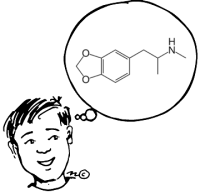January 12, 2007
Mind over Narcotic Matter
 Hastings A, An extended nondrug MDMA-like experience evoked through posthypnotic suggestion, J Psychoactive Drugs. 2006 Sep;38(3):273-83. demonstrates that hypnosis can recreate experiences "36% to 100% similar" to previous drug experiences (Hastings seems to have earlier publications on this too). Neat example of how much our minds can emulate (or convince themselves they are emulating) complex mental states.
Hastings A, An extended nondrug MDMA-like experience evoked through posthypnotic suggestion, J Psychoactive Drugs. 2006 Sep;38(3):273-83. demonstrates that hypnosis can recreate experiences "36% to 100% similar" to previous drug experiences (Hastings seems to have earlier publications on this too). Neat example of how much our minds can emulate (or convince themselves they are emulating) complex mental states.
This raises the question whether this kind of hyponosis should be legal. The motivations stated for most anti-drug laws (I'm going to talk from a Swedish perspective here because that is the one I know best) are based on preventing people from addiction and the negative effects of drug-use, but often stated in terms of particular chemicals or mental effects (such as producing euphoria, see narkotikastrafflagen §8). If hypnotically produced states mimic drugs well enough they could exhibit euphoria and in principle be both addictive and potentially health-damaging (at least by eliciting irrational behavior). In that case they would fulfill at least the criteria by Swedish law to be drugs, except of course that there is no physical substance. I have a hard time believing that one could arrest a hypnotist for suggesting to people that they behave in a particular way, especially since this particular kind of behavior is a non-specific internal state rather than an order to do a particular thing. Conversely, it seems strange to think that the rather puritan Swedish laws would not change if people were getting happy from street hypnotizers.
Should the means used to bring about a mental state matter? If I'm hallucinating and chummy, does it matter whether I got so through a drug, hypnosis or TMS? To some extent the means may matter in terms of health risks (a big part in the Swedish legal definitions of drugs at least) and addictiveness. Hypnosis might be a sufficiently safe form of producing weird mental states that there is nothing to criticise there. But it seems to me that there is a need to not just get out of list-based definitions of drugs but also the assumption that a drug has to be a chemical. We will likely get technologies enabling very interesting, useful and potentially dangerous mental states in the near future.
What should be avoided is not the taking of chemicals or achieving odd states of mind, but avoiding addiction. Addiction is a form of mis-learning that reduces human freedom of action. It is not necessarily tied to a chemical: there are clearly many addictive behaviors, be they sex, shopping or some forms of religion.
A future "anti-addiction" law might instead restrict activities and technologies that can induce addictive states in the user. That is really the only part of drug use and mind-hacking that really needs legislation beyond the obvious safety concerns. This might enable a smarter policy of reducing the harm of drug (and hypnosis) use, putting in the effort where it really is needed.
Posted by Anders3 at January 12, 2007 07:33 PM